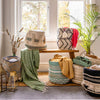The Ultimate Guide to Choosing the Best Wood for Your Chopping Board

A wooden chopping board is more than just a kitchen essential—it’s a daily companion for every home cook. Whether you’re dicing vegetables, carving a Sunday roast, or serving up cheese and bread, the right board can make all the difference. But with so many options out there—teak, acacia, maple, mango, and more—how do you know which is the best wood chopping board for your kitchen?

In this ultimate guide, we’ll break down the most popular wood types, compare their pros and cons, and help you find the perfect fit for your cooking style. If you’re looking for a sustainable, beautiful, and long-lasting addition to your kitchen, read on.
Why Choose a Wooden Chopping Board?
Wooden chopping boards have long been a favourite among both home cooks and professional chefs. They’re gentle on knives, naturally antibacterial, and—when made well—can last for years. Unlike plastic, wooden boards don’t contribute to microplastic pollution, and they’re often beautiful enough to double as serving platters8.
At Vayu Earth, we’re passionate about ethically produced, artisan-crafted kitchenware. Our wooden chopping boards are handmade from responsibly sourced materials, combining sustainability with timeless style.
Comparing the Most Popular Wood Types
Let’s take a closer look at the best woods for chopping boards, weighing up their strengths and weaknesses so you can make an informed choice.
Teak

Overview:
Teak is a tropical hardwood known for its rich golden-brown colour and high oil content. It’s a classic choice for both furniture and kitchenware.
Pros:
- Highly resistant to moisture, bacteria and stains due to its natural oils.
- Durable and hard-wearing. Less likely to wrap or crack.
- Requires less frequent oiling compared to other woods.
- Beautiful grain and colour, making it a striking addition to any kitchen.
Cons:
- Can be hard on knives due to its silica content.
- Usually more expensive than other options.
- Sourcing matter - Always choose FSC-certified or responsibly sourced teak to avoid contributing to deforestation.
Best for:
Cooks who want a low-maintenance, long-lasting and water resistant board that looks stunning on the worktop.
Acacia

Overview:
Acacia is an increasingly popular choice for chopping boards, prized for its attractive grain and eco-friendly credentials.
Pros:
- Hard and durable with a Janka hardness similar to teak.
- Sustainable - acacia trees grow quickly and are often harvested responsibly.
- Naturally antibacterial making it a hygienic choice.
- Distinctive grain patterns add a decorative touch.
Cons:
- Can be prone to slight warping if not cared for properly.
- Requires regular oiling to maintain its appearance and prevent drying out.
Best for:
Eco-conscious cooks who want a beautiful, sturdy board with unique character.
Maple

Overview:
Maple is a classic North American hardwood, often considered the gold standard for chopping boards in professional kitchens.
Pros:
- Dense and durable - resists deep cuts and gouges.
- Gentle on knives, helping them to stay sharper for longer.
- Light, neutral colour suits any kitchen style.
- Readily available and often more affordable than teak.
Cons:
- Requires regular oiling to prevent drying and cracking.
- Can stain more easily due to its lighter colour.
- Less resistant to water than teak, so avoid soaking.
Best for:
Everyday cooks who want a reliable, long-lasting and knife-friendly chopping board.
Mango Wood

Overview:
Mango wood is a sustainable option, often made from trees that have finished bearing fruit. It's gaining popularity for both its eco-credentials and its warm, rustic look.
Pros:
- Sustainable and eco-friendly - utilises trees that would otherwise be discarded.
- Attractive grain and colour, with natural variations.
- Lighter weight than some other hardwoods, making it easy to handle.
Cons:
- Slightly softer than teak or maple, so may show knife marks sooner.
- Needs regular oiling to prevent drying and cracking.
- Less common in the UK, so quality can vary. Choose artisan brands like Vayu Earth for peace of mind.
Best for:
Those seeking a sustainable, stylish board that’s a little lighter and easier to move around the kitchen.
Walnut

Overview:
Walnut is a premium hardwood with a deep, rich colour and a luxurious feel.
Pros:
- Dense but not too hard, making it gentle on knives.
- Striking dark colour hides stains and marks.
- Smooth texture and elegant appearance.
Cons:
- More expensive than acacia or maple.
- Slightly softer, so may show dents from heavy chopping.
- Requires occasional oiling to maintain its finish.
Best for:
Cooks who want a statement piece that's as functional as it is beautiful.
Other Woods: Beech, Oak and Cherry
- Beech is affordable and hard but can shrink and stain if not properly maintained.
- Oak is durable but can be too porous making it less ideal for kitchen use.
- Cheery is gentle on knives and has a lovely warm tone but is softer and may show marks sooner.
What Makes the Best Wood Chopping Board?

- Hardness: A Janka hardness between 900 and 1500 is ideal - hard enough to resist cuts but not so hard it dulls your knives.
- Grain: End-grain boards are gentle on knives and self-healing but edge-grain boards are more affordable and still durable.
- Sustainability: Always opt for responsibly sourced wood and artisan craftsmanship, like the boards from Vayu Earth.
- Maintenance: All wooden boards need regular oiling and should be washed by hand, never soaked or put in the dishwasher.
At Vayu Earth, we offer a curated selection of handmade wood chopping boards crafted from teak, acacia, mango, and more. Each board is a testament to traditional craftsmanship, sustainability, and ethical production. Explore our collection to find the perfect match for your kitchen.
Final Thoughts

Choosing the best wood chopping board for your kitchen comes down to your cooking style, aesthetic preferences, and commitment to sustainability. Whether you’re drawn to the rich tones of teak, the eco-friendly appeal of mango, or the classic reliability of maple, a quality wooden board will serve you well for years to come.
Remember: care for your board with regular oiling, avoid soaking, and enjoy the tactile pleasure of preparing food on a surface that’s as beautiful as it is practical.
Ready to upgrade your kitchen? Discover the Vayu Earth difference with our artisan-crafted, sustainable chopping boards - where every meal begins with a story of craftsmanship and care.





